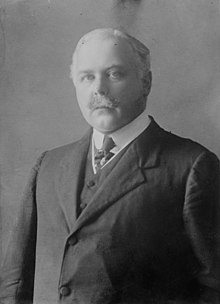Alexander William Charles Oliphant Murray, 1st Baron Murray of Elibank
|
The Right Honourable The Lord Murray of Elibank PC |
|
|---|---|
 |
|
| Comptroller of the Household | |
|
In office 18 December 1905 – 5 June 1909 |
|
| Monarch | Edward VII |
| Prime Minister |
Sir Henry Campbell-Bannerman H. H. Asquith |
| Preceded by | The Viscount Valentia |
| Succeeded by | The Earl of Liverpool |
| Under-Secretary of State for India | |
|
In office 5 June 1909 – 14 February 1910 |
|
| Monarch | Edward VII |
| Prime Minister | H. H. Asquith |
| Preceded by | Thomas Buchanan |
| Succeeded by | Hon. Edwin Samuel Montagu |
| Parliamentary Secretary to the Treasury | |
|
In office 14 February 1910 – 7 August 1912 |
|
| Monarch |
Edward VII George V |
| Prime Minister | H. H. Asquith |
| Preceded by | Jack Pease |
| Succeeded by | Percy Illingworth |
| Personal details | |
| Born | 12 April 1870 |
| Died | 13 September 1920 (aged 50) |
| Nationality | British |
| Political party | Liberal |
| Spouse(s) | Hilda Murray (d. 1929) |
Alexander William Charles Oliphant Murray, 1st Baron Murray of Elibank PC (12 April 1870 – 13 September 1920), called The Master of Elibank between 1871 and 1912, was a Scottish nobleman and liberalLiberal politician. He served as Parliamentary Secretary to the Treasury (Chief Government Whip) under H. H. Asquith between 1910 and 1912, when he was forced to resign after being implicated in the Marconi scandal.
Elibank was the eldest son of Montolieu Oliphant-Murray, 1st Viscount Elibank, and Blanche Alice, daughter of Edward John Scott. He was educated at Cheltenham.
Elibank unsuccessfully contested Edinburgh West in May 1895, Peebles and Selkirk in July 1895 and the City of York by-election of 1900. However, in October 1900 he was successfully returned to parliament for Midlothian, a seat he held until 1906 and again from 1910 to 1912. From 1906 to 1910 he represented Peebles and Selkirk.
When the Liberals came to power in December 1905 under Sir Henry Campbell-Bannerman, Elibank was appointed Comptroller of the Household, a post he retained when H. H. Asquith became Prime Minister in April 1908, and then served as Under-Secretary of State for India between 1909 and 1910. The latter year he was made Parliamentary Secretary to the Treasury (Chief Government Whip). In 1911 he was sworn of the Privy Council. However, he was forced to resign in August 1912 after being accused of insider trading in the Marconi scandal. Later the same month he was raised to the peerage as Baron Murray of Elibank, of Elibank in the County of Selkirk.
...
Wikipedia
